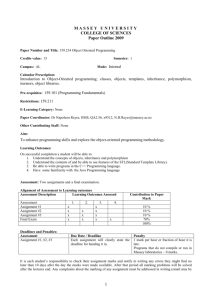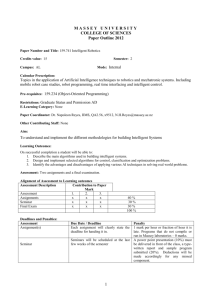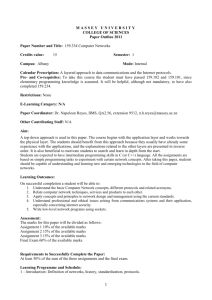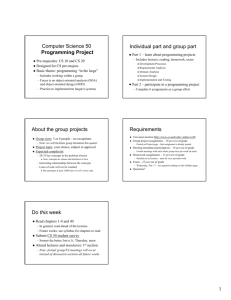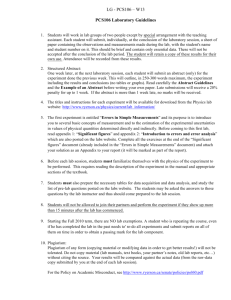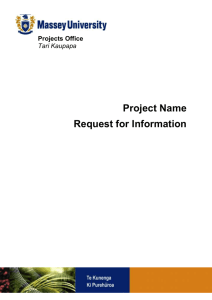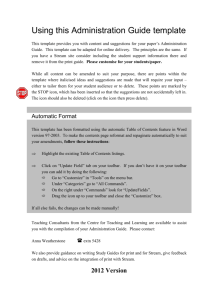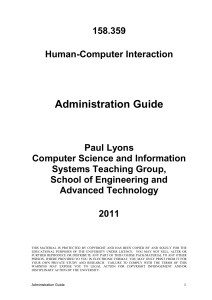Paper Number and Title: 159.354 Architecture & Networks
advertisement
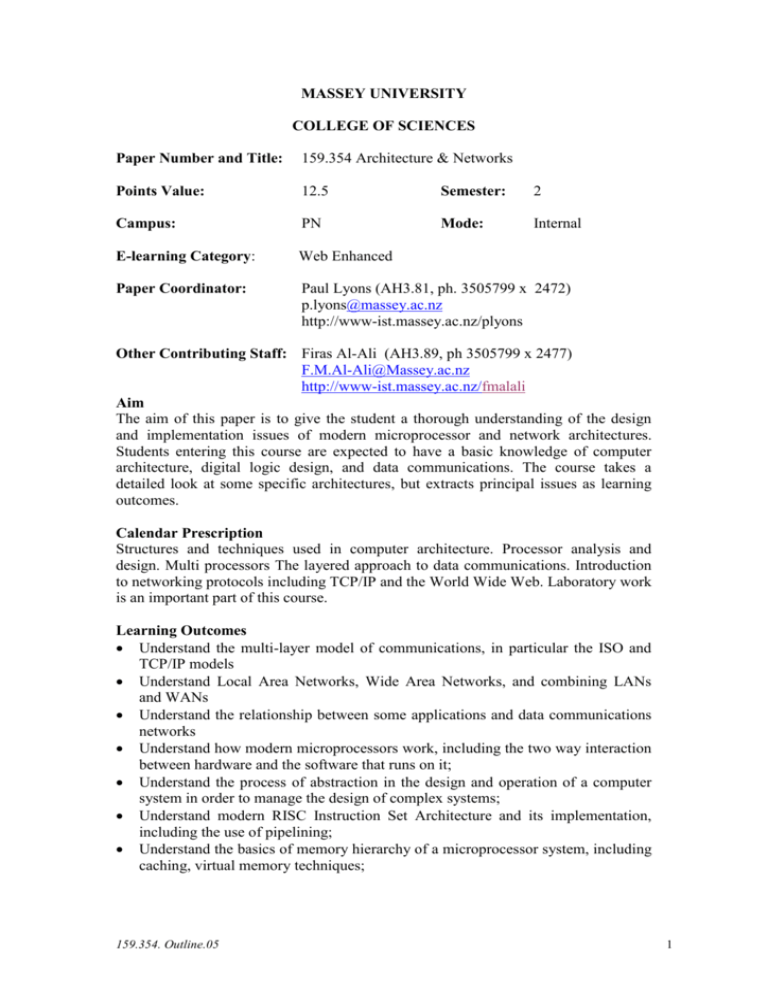
MASSEY UNIVERSITY COLLEGE OF SCIENCES Paper Number and Title: 159.354 Architecture & Networks Points Value: 12.5 Semester: 2 Campus: PN Mode: Internal E-learning Category: Web Enhanced Paper Coordinator: Paul Lyons (AH3.81, ph. 3505799 x 2472) p.lyons@massey.ac.nz http://www-ist.massey.ac.nz/plyons Other Contributing Staff: Firas Al-Ali (AH3.89, ph 3505799 x 2477) F.M.Al-Ali@Massey.ac.nz http://www-ist.massey.ac.nz/fmalali Aim The aim of this paper is to give the student a thorough understanding of the design and implementation issues of modern microprocessor and network architectures. Students entering this course are expected to have a basic knowledge of computer architecture, digital logic design, and data communications. The course takes a detailed look at some specific architectures, but extracts principal issues as learning outcomes. Calendar Prescription Structures and techniques used in computer architecture. Processor analysis and design. Multi processors The layered approach to data communications. Introduction to networking protocols including TCP/IP and the World Wide Web. Laboratory work is an important part of this course. Learning Outcomes Understand the multi-layer model of communications, in particular the ISO and TCP/IP models Understand Local Area Networks, Wide Area Networks, and combining LANs and WANs Understand the relationship between some applications and data communications networks Understand how modern microprocessors work, including the two way interaction between hardware and the software that runs on it; Understand the process of abstraction in the design and operation of a computer system in order to manage the design of complex systems; Understand modern RISC Instruction Set Architecture and its implementation, including the use of pipelining; Understand the basics of memory hierarchy of a microprocessor system, including caching, virtual memory techniques; 159.354. Outline.05 1 Pre- and Co-requisites Prerequisite: 159.253 or 159.203 Restrictions 159.304, 159.306, 159.334 Assessment Networks Lab Assignment 1 (Firas) Assignment 2 (Firas/Paul) Terms Test 1 (Firas) Terms Test 2 (Firas/Paul) 10% 10% 10% 35% 35% 100% 1 hour, held in normal lecture time 1 hour, held in normal lecture time Deadlines and Penalties Deadlines will be shown on the assignments and lab sheets. Penalties are 1 mark loss for each day late, unless medical or other compelling circumstances, duly attested by a competent authority, have occurred. Requirements to Successfully Complete the Paper To pass this paper, you must obtain an overall pass mark, a total mark of at least 35% for the assignments an overall mark of at least 35% for the terms tests Learning Programme and Schedule The following is an approximate schedule of lectures for each topic Approx. no of lectures Networks Topics OSI 1 HDLC 2 Layer 3 (Network) 7 Layer 4 (Transport) 3 Layer 5 (Session) 1 Layer 6 (Presentation) 1 Layer 7 (Application) 2 ISDN/ATM 1 Architecture Topics Abstraction and Technology Instruction Set design Arithmetic Performance ALU design Data path & Control (Single Cycle) Data path & Control (Multi Cycle) Pipelining Memory hierarchy 159.354. Outline.05 1 3 1 1 2 3 2 3 2 ( Chapter 1 ) ( Chapter 2 & Appendix A) ( Chapter 3 ) ( Chapter 4 ) (Appendix B) ( Chapter 5 & Appendix C ) ( Chapter 5 & Appendix C ) ( Chapter 6 ) ( Chapter 7 ) 2 Conditions for Aegrotat Pass: If you are prevented by illness, injury or a serious crisis from attending an examination, or another compulsory assessment element that occurs at a fixed time and place, you may apply for an aegrotat consideration. To qualify for an aegrotat pass on the final examination, you must have attempted at least 40% of the total formal assessment and your performance must be well above the minimum pass standard, so that the examiners can be confident that you would have passed the paper if you had completed the missing assessment. You must apply on the form available from the Examinations Office, the Student Health Service or the Student Counselling Service. Conditions for Impaired Performance: If you consider that your performance in, or preparation for, an examination, or another compulsory assessment element that occurs at a fixed time and place, has been seriously impaired by illness, injury or a serious crisis, you may apply for an impaired performance consideration. You must apply on the form available from the Examinations Office, the Student Health Service or the Student Counselling Service. Student Time Budget 187.5 hours as follows: Lectures Tutorials Architecture Labs Network Labs Assignments, Self study, and exam preparation 36 hours 12 hours 06 hours 16 hours 117.5 hours Textbooks and Other Recommended Reading Patterson and Hennessy: Computer Organisation and Design: The Hardware/Software Interface; 3rd Edition, Morgan Kaufmann; ISBN 1-55860-491-X. Tanenbaum: Computer Networks; 4th Edition, Prentice Hall International; ISBN 0-13038488-7. NB. Both books provide essential material to complement the lecture series. Other books might be referenced during the course. Timetable Four lecture slots will be used per week (3 hours lectures + 1 hour tutorials + 3 hour network labs). Date & Time Topic Location Monday 4 pm Lecture 1 Aston 1 Tuesday 9 am Lecture 2 SSLB7 Thursday 8 am Lecture 3 SSLB7 Thursday 9 am Tutorial Aston 1 Additional Costs Other supplementary handouts might be distributed during the course. 159.354. Outline.05 3 Plagiarism: Massey University, College of Sciences, has taken a firm stance on plagiarism and any form of cheating. Plagiarism is the copying or paraphrasing of another person’s work, whether published or unpublished, without clearly acknowledging it. It includes copying the work of other students. Plagiarism will be penalised; it is likely to lead to loss of marks for that item of assessment and may lead to an automatic failing grade for the paper and/or exclusion from enrolment at the University. Proposed Feedback and Support for Student Learning: These are the processes by which students will be able to seek assistance. These will consist of both formally organized feedback (e.g. comments on assignments, seminars), and any less formal assistance given to the students. The feedback will occur in a manner that aids the student’s learning process, and also that the assistance is available in reasonable timeframes. The turnaround time for assignments will be no more than three weeks from the due date. It is important to note that the specified timeframe applies only to those assignments submitted by the due date, and does not necessarily apply to those submitted late. Students may contact the course lecturers by phone, by email or by appointment. Grievance Procedures A student who claims that he/she has sustained academic disadvantage as a result of the actions of a University staff member should use the University Grievance Procedures. Students, whenever practicable, should in the first instance approach the University staff member concerned. If the grievance is unresolved with the staff member concerned, the student should then contact the College of Sciences office on his/her campus for further information on the procedures, or read the procedures in the University Calendar. Additional Information and Advice: Informal Feedback and assistance may be sought from the appropriate lecturer by email, telephone, or appointment. 159.354. Outline.05 4
